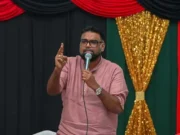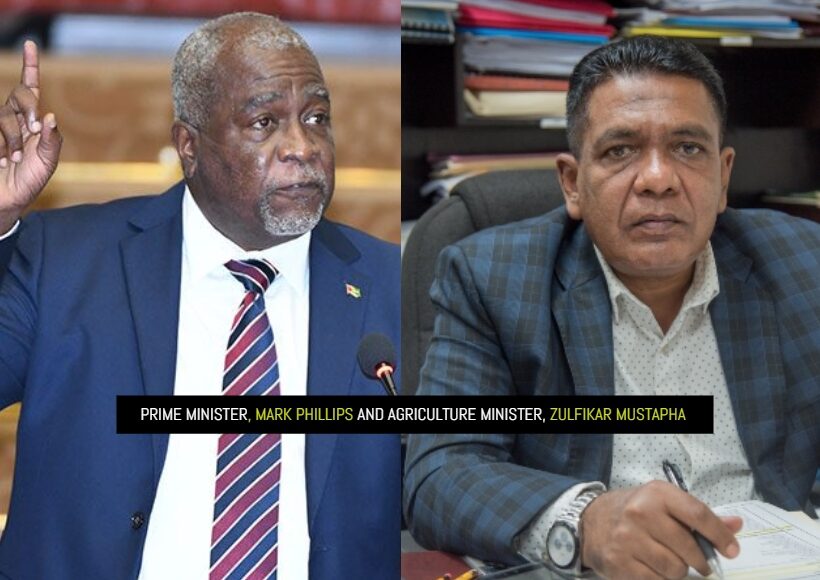Prime Minister Brigadier (Ret’d), Mark Phillips and Minister of Agriculture Zulfikar Mustapha on Friday morning gave a detailed account to the National Assembly on the expenditure of an advance of $8.5 billion from the Contingency Fund.
First up was Prime Minister Phillips. He informed the House that the $4 billion advance was used for power generation for the Guyana Power and Light (GPL) Inc.
When asked to desegregate the $4 billion, PM Phillips disclosed it was utilised to purchase 547,000 barrels of fuel at a cost of US$34 per barrel. The fuel was supplied to customers on the Demerara Berbice Interconnected System (DBIS), and also Essequibo and Bartica. “Wherever GPL operates their generators the money is utilised to supply fuel and to cover all Guyana Power and Light operations,” the Prime Minister stated.
Opposition Member of Parliament (MP) David Patterson stated that according to the calculations from the figure presented to the House, it adds up to only $3.6 billion. As such he asked PM Phillips to account for the remaining $400 million.
“The other 400 million would have been utilised for other fuel related costs, you have to purchase oils, lubricants…,” Phillips responded.
To this end, he assured that the money was spent on what it was appropriated for, “that is to keep the lights on for the people of Guyana…”
Minister Mustapha then gave account for the $4.5 Billion that was used for operations at the Guyana Rice Development Board (GRBD) and Guyana Sugar Corporation (GuySuCo).
The minister explained that GRBD never collected subvention from the Central Government, but during the COVID-19 pandemic which caused issues with the supply chain, the millers requested that the Government of Guyana (GoG) reduced the commission they had to pay to GRDB.
“As a caring government…we reduced the commission by 25% and as a result of that we had to find funds to replenish GRDB’s account,” Minister Mustapha explained.
He further explained that when the price for paddy was low, farmers met with the government and requested that they work with the millers to get a minimum price for the paddy.
“We had a discussion with the millers and they said if we forego the commission at that time they will increase the minimum price of $4000 a bag for paddy,” he said.
As a result of the government removing the commission, the farmers were able to get a price of $4,500 for a bag of their paddy.
The minister explained that this caused a shortfall of $524 million. The breakdown of that sum is $404 million for employment cost, $42 million for material and supplies, $11 million for utilities, $21 million for out-of-crop maintenance, and $43 million for field operations.
For his part, Opposition MP Vinceroy Jordan asked when the commission was restored and when last was it paid to GRDB. Minister Mustapha disclosed that it was restored in September 2023, but noted that the government is only collecting 75% of the original commission because it was reduced by 25%. He added that the agency is working to return to the 100% collection of the commission.
Notably, the minister explained that there were unforeseen activities that came after the presentation of the budget, that is why money was taken from the budget to offset those expenses which resulted in the $524 million advance from the contingency fund to replenish the GRDB account.
Moreover, as it relates to the $4.042 billion for GuySuCo, the minister explained that from 2023 to sometime this year the industry was affected by the El Niño weather conditions, which caused a shortfall of production for the first crop.
“We had to do a lot of mechanization, we had to do a lot of replanting, we had to do a lot of operations in the field to get proper irrigation…” the minister said.
Notably, the minister explained that as a result of the weather condition which caused the shortfall in sugar production and revenue, the government had to take the $4.042 billion advance.
Giving a breakdown, the minister said 76% of the advance was used to pay wages and salaries, 7% for pension, 10% for fuel, 5% for contractors’ payment, and 3% for material cost. Notably, the minister committed to lay over the complete desegregation of the $4.042 billion.













